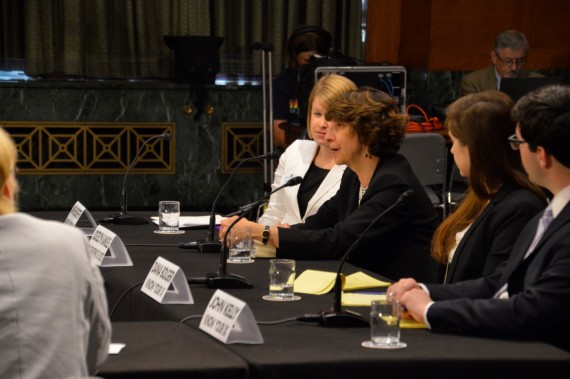WASHINGTON – Title IX is about more than giving women a fair shot on the playing field – it’s about making sure the environment is safe and equal off of it as well.
But when it comes to enforcing Title IX, the law forbidding gender discrimination in schools that receive federal funding, administrators have struggled with preventing sexual assaults and preserving honesty about reports of those assaults.
Sen. Claire McCaskill, D-Mo., held a roundtable discussion about Title IX and college campuses Monday, tackling questions such as should each school create its own policies on sexual misconduct or follow a universal checklist? How much time is enough to report an assault? Are penalties too harsh for schools that have Title IX compliance issues? And where is the line between a duty to report a crime and concern for victims’ privacy? Jocelyn Samuels, Department of Justice acting assistant attorney general for civil rights, said each university has a unique campus and one policy can’t govern all.
“We don’t want is universities just cutting and pasting,” she said.
Samuels mentioned a checklist put out last month by the president’s task force on sexual assault that includes what elements of policy schools need to cover.
Colleges across the country reported 3,948 forcible sex offenses on campus in 2012, the most recent year for which data are available.
Two problems that arise in sexual assault cases on campuses are how much time students should have to report an attack and how much time should universities have to investigate a report.
University of Texas Medical Branch Title IX coordinator Cat Riley said 60 days is ample time for an investigation, but only if it is clear who victims should contact.
Victim Rights Law Center deputy director Lindy Aldrich said that, even if it is ample time, some students just don’t know what to do.
“We’re typically talking about an 18- to 19-year-old who’s brand new to a community, and now we expect them to get to the right person who has the knowledge. It’s not going to happen to get an 18- to 19-year-old to a vice chancellor to report their rape,” she said.
John Kelly, a trained rape crisis counselor for Massachusetts, said students’ schedules should be considered. “You have one semester to decide whether or not you want to file a complaint, that’s not long at all,” Kelly said. “Then for the next three years, you’re living on the same campus with your assailant. That’s an awful next three years just for missing a deadline.”
Concerned with “survivors of the queer community,” Kelly applauded a recent Q&A on the Department of Education’s website for its effort to include sexual assault in the lesbian, gay, bisexual and transgender community on campuses. Kelly said universities often fail to acknowledge how “rampant” same-sex sexual violence is on their campuses.
The panel spent some time discussing what could be done to hold universities accountable for compliance without punishing innocent students.
A majority agreed that the only current penalty, removing all federal funding, was too severe a punishment, some calling it “Draconian.”
A Department of Education spokesman said in an email statement that the department tries to remedy situations without the severest of punishments and that “over the last decade, the U.S. Department of Education’s Office for Civil Rights has not had to resort to termination of funds” to reach compliance with Title IX.
McCaskill said issues with Title IX might come up with the very wording of the legislation itself, citing one paragraph in particular.
“This one really kills me,” she said before she read it aloud: “The student has to show that harassment was severe, pervasive and objectively offensive.”
McCaskill said new legislation may be needed.
“Does it have to be severe and pervasive? Isn’t severe enough? Isn’t pervasive enough?” she asked.
McCaskill introduced a fictional scenario in which a college dorm resident assistant at a school anonymously receives a video of a female student being assaulted by three male students and all parties can be identified. In the scenario, the victim asks the RA not to report the assault.
McCaskill asked the panel members if they believed the RA has an obligation to report the video.
Kelly said employees have an obligation to report, but it doesn’t mean the university has to pursue an investigation.
“There can be serious mental risks for the survivor by making them go through really traumatizing processes without returning any sense of agency to them,” he said.
Samuels said the problem of sexual assault on college campuses can be fixed only if it is reported.
McCaskill agreed.
“I’ve seen men say, ‘We can’t charge a rape case because the victim was on birth-control,’ that’s how old I am. I think so often victims hear the horror stories, and they don’t realize that there are men and women who dedicate their lives to balancing out the process,” McCaskill said. “Prosecutors can’t be criticized for cases that aren’t being reported, they can be criticized for not doing what they can so that victims feel safe about making a report.”
Reach Ricardo Guillaume at [email protected] or 202-326-9865. SHFWire stories are free to any news organization that gives the reporter a byline and credits the SHFWire.










